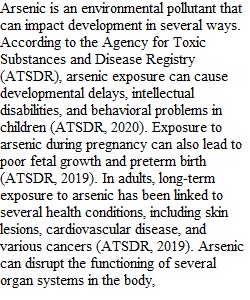


Q Scenario You are a paralegal; your job is to review applications for a class action lawsuit. Currently, you are working to find individuals who have been exposed to high levels of arsenic in the local drinking water, negatively impacting their health and development. (Learn more about the impact of arsenic on human development on the Agency for Toxic Substances and Disease Registry website). You are meeting with individuals seeking to join in the lawsuit due to their health experiences. However, your boss is acutely aware of the Adverse Childhood Experiences (ACEs) Study and is highly concerned that the individuals in the community have other exposures or genetic issues that have influenced their health. Consider Jacob. Jacob is a 45-year-old man who is married and works a full-time job as a coal miner. Jacob was born with born developmentally delayed. His IQ is low, and he was in speech therapy throughout his childhood. Jacob had bladder cancer when he was 12 years old. He received chemotherapy and has been in remission since. Jacob’s parents divorced when he was ten due to domestic violence and alcohol abuse issues in the home. His father was an alcoholic, and Jacob’s parents smoked cigarettes. Jacob always had a positive relationship with his mother, who did her best to protect him from abuse and his father’s anger. Jacob and his mother have a tight bond because of their experiences with Jacob’s father. Jacob has not seen his father since the divorce and recently learned that his father died from lung cancer. Jacob struggles when he gets mad, often yelling or stomping around and hitting walls. Jacob’s mother often showed fear when Jacob would get angry as a teen. Jacob’s extended family constantly notes that he is the spitting image of his father, sharing a similar height, weight, and coloring. As Jacob ages, he is starting to have health problems similar to his mother, including skin lesions and respiratory issues. Instructions The lead attorney has asked you to go through Jacob’s summary and highlight things that might be related to Jacob’s exposure to arsenic in the drinking water. He also wants you to explain which things may be related to genetics and the environment in which Jacob was raised. You will use the following template to provide the needed information in your report. Since your analysis will be used as a part of the case, you must use complete sentences to explain your assessment as well as academic sources, references, and citations. ARSENIC CLASS ACTION SUIT 1. Explain how arsenic (an environmental pollutant) can impact development. Write your one-paragraph answer here. Include an in-text citation. 2. Identify examples from the client history that would be attributed to arsenic exposure. Write your one-paragraph answer here. Include an in-text citation. 3. Explain the role of genetics in shaping development. Write your one-paragraph answer here. Include an in-text citation. 4. Identify examples from the client history that would be genetic or hereditary issues. Write your one-paragraph answer here. Include an in-text citation. 5. Explain the role of the home environment in the developing individual. Write your one-paragraph answer here. Include an in-text citation. 6. Identify examples from the client history that would be issues related to the home environment. Write your one-paragraph answer here. Include an in-text citation. 7. Describe how pollution, genetic factors, and environmental factors are interacting in this case. Write your one-paragraph answer here. Include an in-text citation. References List your references here in APA format. These must align with the in-text citations above.
View Related Questions